China Arts & Entertainment
The Unforgotten Victory: Why ‘The Battle at Lake Changjin’ Is One of China’s Biggest Films Yet
21st century Chinese moviegoers have never been more dedicated than they are to The Battle at Lake Changjin.
Published
2 years agoon

PREMIUM CONTENT ARTICLE
Chinese war movie The Battle at Lake Changjin became a social media sensation this fall. Why did this particular movie become so successful in Chinese cinemas and on social media?
This is the “WE…WEI…WHAT?” column by Manya Koetse, original publication in German by Goethe Institut China, visit Yi Magazin: WE…WEI…WHAT? Manya Koetse erklärt das chinesische Internet.
It’s the biggest Chinese movie of the moment: The Battle at Lake Changjin (长津湖). The war epic dominated all top trending lists on Chinese social media during the Golden Week holiday this year, and it became an unprecedented box office hit after it premiered on September 30, just one day before the celebration of the National Day of the People’s Republic of China.
The blockbuster, literally titled ‘Changjin Lake’ in Chinese, even became the highest-grossing film anywhere in the world during the first weekend of October, beating the much-anticipated James Bond movie No Time to Die.
Three weeks after its premiere, the movie grossed over 5 billion yuan ($792 million) and smashed 24 records in Chinese film history, including becoming the first Chinese film ever to break 400 million yuan at the daily box office for six consecutive days. The Battle at Lake Changjin is set to become the nation’s highest-grossing film ever.
Everything about Changjin Lake is big, from its unparalleled budget to all-star cast and production team. Written by Lan Xiaolong (兰晓龙) and Huang Jianxin (黄欣), the three-hour film is directed by famous film directors Chen Kaige (陈凯哥), Tsui Hark (徐克) and Dante Lam (林超贤), and features big names including Chinese actors Wu Jing (吴京) and Jackson Yee (易烊千玺). The production involved as many as 7000 crew members and 70,000 extras over 200 days of filming.
The movie is by no means China’s first big movie focused on the history of war. Why this movie has become such a major hit has to do with a combination of several factors. Here, we’ll explore how the film’s specific topic and narrative, the timing of its premiere and online media dynamics contributed to Changjin Lake’s unprecedented success and the social media craze surrounding it.
Changjin Lake: “The Motherland Will Never Forget”
Three bright red characters are prominently featured on the movie poster for The Battle at Lake Changjin: 长 津 湖 Chang Jin Hu (Changjin Lake), Chinese for what is also known as Chosin, the man-made lake located in the northeast of the Korean peninsula where one of the most important and harrowing battles of the Korean War (1950-1953) took place.
Below the title, the poster shows six smiling soldiers sitting on an American tank, in the background, the remains of battle are visible in between the snow-covered mountains under white sky.
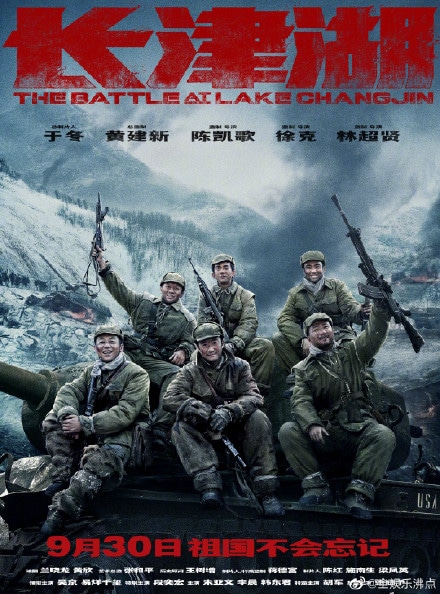
The official movie poster for The Battle at Lake Changjin.
The movie tagline, also displayed on the poster in red characters, says: “The motherland will never forget” (“祖国不会忘义“). But what is it exactly that China will “never forget”?
It was November 27 of 1950 when the Battle of the Chosin Reservoir began. The Korean War had started just five months before, on June 25, when North Korea invaded South Korea. The American-led U.N. forces, commanded by Douglas MacArthur, came to support South Korea. By early October, they had crossed over the 38th Parallel in an attempt to occupy North Korea and soon neared the Chinese border.
The government of the newly-established People’s Republic of China, led by Mao Zedong, ordered the Chinese People’s Volunteers Force (CPVF) to join North Korea in the war, referred to as ‘the War to Resist America and Aid Korea’ (抗美援朝战争). For multiple reasons, the U.N. advance into North Korea posed a threat to the brand-new communist regime, and Mao eventually sent approximately 260,000 “volunteers” to the Korean front in October of 1950.1
The movie Changjin Lake provides a Chinese perspective on the start of the Korean War and the lead-up and unfolding of the battle of Chosin Reservoir, a massive ground attack of the Chinese 9th Army Group against American forces, preventing them from driving Kim Il-Sung and his government out of North Korea.
The film specifically follows the Wu brothers, company commander Wu Qianli (Wu Jing) and the young volunteer soldier Wu Wanli (Jackson Yee), and their fellow soldiers fighting side by side in extreme conditions.
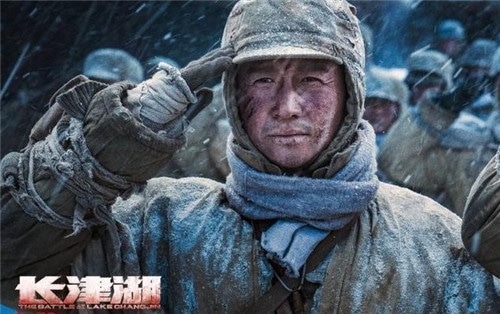
Through elaborate and spectacular battle scenes, Changjin Lake shows the violent confrontations and brutal sufferings during the battle, that went on for seventeen days. Some 150,000 Chinese soldiers encircled and attacked the U.N. forces from the surrounding hills at the Chosin area.
Tens of thousands of lives were lost on both the Chinese and American side in the bitter cold and fierce fighting. From the start of the attack to December 14th, nearly 30,000 Chinese men died of frostbite at the site of the battle and the surrounding snowcapped mountains, where temperatures would drop 20-30 degrees below zero.2
The Chosin battle and the Korean War are generally not as well-known in the U.S. and Europe as they are in China. In America, the Korean War is even referred to as the “Forgotten War”, even though it played a major role in the international community and shaped the world as we know it today.
The Changjin Lake movie is the living proof of how the Korean War and the Chosin battle are anything but forgotten in China. The Chinese attack at Chosin is remembered as a glorious victory and strategic success for turning around the war situation in Korea and leading to a withdrawal of most of the UN forces by late 1950. The battle set the stage for the ceasefire that eventually ended the war in 1953.
The epilogue of Changjin Lake also explains how the battle “completely tipped the scales of the Korean War” and “set a perfect example for annihilating a U.S. reinforced regime,” calling Chosin “the greatest setback in the history of the Marine Corps.”
The movie’s narrative and script recurringly underline why this particular historical event should not be forgotten by the Chinese people. In one of the film’s earlier scenes, Mao Zedong (played by Tang Guoqiang, the actor who has played Mao over a dozen times) talks to military leader Peng Dehuai in the days leading up to China’s decision to send out troops to North Korea:
“[Our] country is newly established and thousands of things are waiting to be done. If it’s for our current situation, I really don’t want to fight this war. But if it’s for the future, and the peaceful development of our country over a few decades or a century, we must fight this war. The foreigners look down on us. Pride can only be earned on the battlefield.”
It is a scene that is telling for the narrative the movie conveys about the Chosin battle and the war at large, during which the Chinese troops were severely underestimated by the well-equipped U.N. forces.
After the ‘Century of Humiliation,’ the time from the mid-1800s to the mid-1900s during which China was attacked, weakened, and torn by foreign forces, the Korean War and Chosin battle showed that the military strength of the People’s Republic of China was a new force to be reckoned with. By showing this strength, China did not just save the North Korean regime but also defended its own borders and the nation’s prestige.
The determination and fighting spirit of the Chinese soldiers at Chosin as depicted in the movie – one impressive scene shows dozens of soldiers frozen into “ice sculptures” while still in battle posture – strikes a chord with Chinese audiences.

Promotional image for Changjin Lake, showing the two brothers Commander Wu Qianli (right, played by Wu Jing) and Wu Wanli (played by Jackson Yee).
At one point in the movie before the battle begins, a member of the Chinese People’s Volunteer Army says: “If we don’t fight this battle, it will be our next generation who will fight it.”3 It is a line that is brought up by many netizens on Chinese social media.
“I was very moved after I watched the film, and this phrase just stayed with me,” one Weibo commenter writes: “They sacrificed their blood to bring us peace, and I salute them.”
Another Weibo user shares the phrase, along with a photo of cinema tickets for Changjin Lake, writing: “I am grateful for the blood that was shed by countless revolutionary martyrs for the stable lives we now have. National peace and stability are not easy to gain. We should cherish every day.”
When the narrative of the movie and China’s role in the Korean War was questioned by former journalist Luo Changpin (罗昌平) on his Weibo account in October of this year, he was arrested for defaming national heroes and martyrs. Luo allegedly mocked Chinese soldiers by saying they “never doubted the ‘wise decisions’ of their higher-ups.”
A hashtag related to the news of his arrest (#罗昌平被批捕#) garnered over 350 million views on Weibo, with many netizens condemning Luo’s criticism and applauding his detainment.
“I hope they give him frozen potatoes to eat,” one popular comment said, referring to the Chinese soldiers in North Korea who had nothing else to eat. Many felt that there was just one punishment that would be appropriate for him: “They should send him to Chosin, the weather is cold up there.”
Relevant Timing: “The Chinese Are Not to Be Messed With”
The specific timing for The Battle at Lake Changjin to premiere in Chinese theatres is noteworthy and has helped in boosting its success.
Firstly, the movie was released during the National Holiday, the seven-day holiday period starting 1 October that has become the most important movie season in China and annually sees the launch of the biggest domestically produced movies. Changjin Lake’s premiere coincided with China’s Martyr’s Day on September 30, which commemorates Chinese national heroes who sacrificed life to protect the motherland.
The Chinese epic was also launched as part of the 100th anniversary of the Communist Party of China. This anniversary has played a major role in China’s popular culture over the past year, with various movies and TV series being launched dedicated to the hundred years of history since the Communist Party was founded in 1921.
Perhaps more importantly, the popularity of The Battle at Lake Changjin comes at a time of escalating political tensions between the U.S. and China, accompanied by a rise of Chinese nationalism.
Chinese state outlet Global Times recently emphasized how ticket sales of the Changjin Lake movie were boosted amid China-US tensions, quoting Chinese film critic Xiao Fuqiu, who said that the popularity of Changjin Lake “fits the national sentiment in the constant rivalry between China and the US.”
Exploring how the launch of the movie and its success relates to anti-American sentiments in China leads to somewhat of a chicken and egg situation. Was the hit movie launched because of the current geopolitical climate, or are Chinese audiences more receptive to the theme because of it? The answer is probably somewhere in the middle, and one conclusion doesn’t exclude the other.
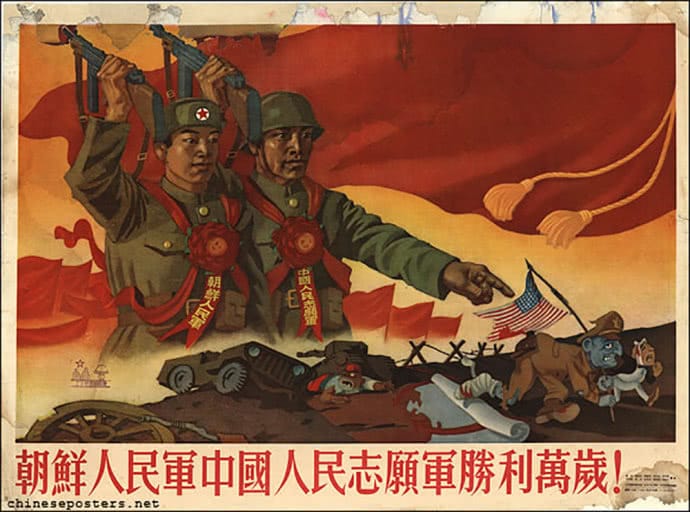
Chinese Korean War propaganda poster, via Chineseposter.net.
In 2019, during the initial phases of the US-China trade war, CCTV 6, the movie channel of China’s main state television broadcaster, surprised Chinese audiences by changing their schedule and playing ‘anti-American’ Korean War movies for three nights in a row. The move showed that there is an apparent urgency for Chinese popular films to draw attention to events that are deemed of historic importance in today’s political climate.
The day before the launch of Changjin Lake, various Chinese media included a quote by one of the movie’s writers, Huang Jianxin, in saying that the film is supposed to convey that “the Chinese are not to be messed with.”4
After it became clear just how much the movie had raised at the box office, English-language Chinese state media Global Times seemed to gloat about the success, writing that “the movie pushed the patriotic sentiment of people across the country to a peak amid the tense China-US competition and China’s effective control of the epidemic.”
The Social Media Era of Chinese Blockbusters
Just twenty days after the premier of Changjin Lake, a hashtag dedicated to the film hit a staggering 2.2 billion views on Weibo (#电影长津湖#). Besides this hashtag, there are countless other hashtags, online discussions, and fan groups dedicated to the movie on Chinese social platforms from Weibo and Zhihu to Bilibili, TikTok, and Douban.
The premier of Changjin comes at a time when China’s commercial cinema is increasingly thriving. Over the past few years, several locally-made films have become major hits in China – not just in the cinemas, but also on social media.
One of the highest-grossing films in mainland China of the past years is the patriotic “Rambo-style” action blockbuster Wolf Warrior II (战狼2, 2017), which also features Wu Jing as the hero star. The film tells the story of a special forces soldier who battles foreign mercenaries and helps Chinese and African citizens during a local war in Africa. The film became a social media sensation in 2017 and broke box office records.
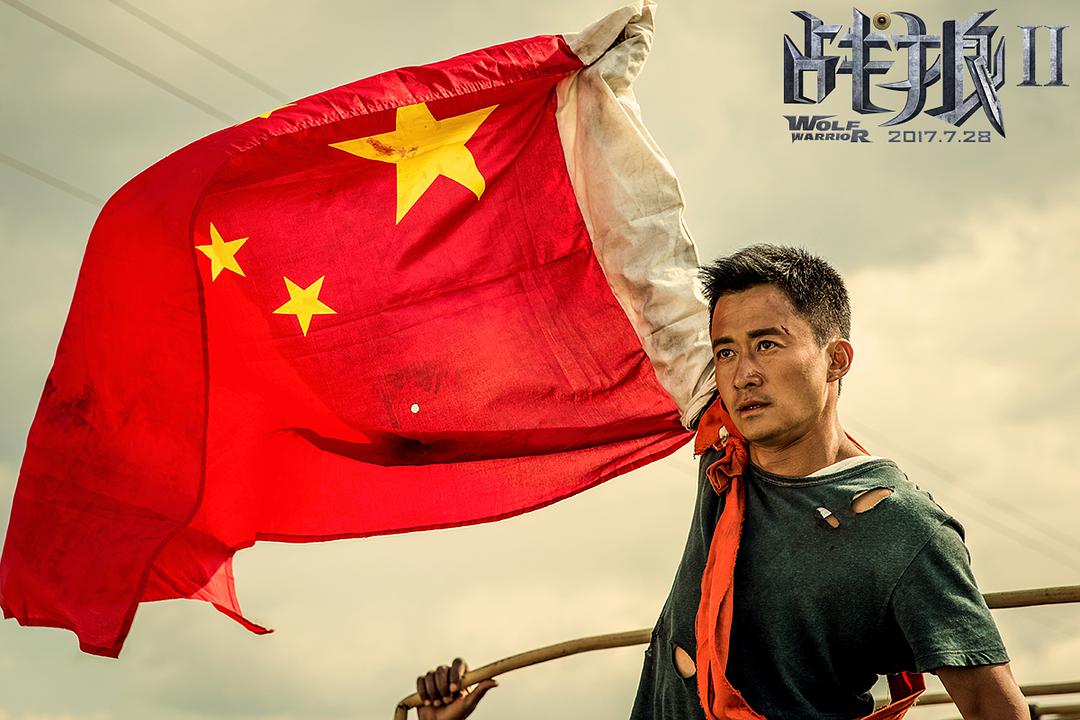
Movie poster for Wolf Warrior II.
The Battle at Lake Changjin is similar to Wolf Warrior II in various ways: they’re both Hollywood-style commercial entertainment blockbusters that are set overseas, incorporate official narratives, and are immensely patriotic, speaking to the growing nationalist sentiments among Chinese moviegoers and netizens. Both movies were huge topics on Chinese social media, with online fan groups and discussions snowballing their popularity.5
In “The Era of Baokuan Films: How Chinese Social Media Creates Box Office Successes” (2021), author Xiao Yang argues that there is an emergence of a group of movies in China that become major hits (‘baokuan’ 爆款) through the Internet and social media, relying on online marketing strategies and netizens’ involvement in the film’s promotion.
Rather than just passive movie watchers, the social media era has made Chinese audiences more active in interacting with domestic movies, producing their own content, including opinions, feedback, and memes.6 The success of major Chinese movies such as The Wandering Earth (流浪地球2019), Ne Zha (哪吒之魔童降世 2019) or Dying to Survive (我不是药神2018) could partly be attributed to the interplay between social media and film engagement.
One example of the new dynamics between Chinese movies and the online environment is the 2021 hit movie Hi, Mom (你好,李焕英), which features the story of a daughter who travels back in time and meets her own mother as a young woman and befriends her. The movie led to an online trend in China of netizens sharing stories and photos of their mothers when they were young, triggering online discussions on what they would tell their mums if they could go back in time.
Although the movie and its online marketing strategy initially sparked the trend, the social media responses further added to the success of the film. In this way, film audiences also become marketers of the movies they are interacting with.
In this social media age, Chinese movies also have their own official accounts to promote their movie and define their online presence. The Changjin Lake movie has its own account on Weibo and on TikTok, and the film started its online marketing campaign as early as October of 2020, a year before its premiere.
The official online presence of Chinese movies also means they can interact with fans and other accounts. On October 20 of 2021, just when it became known that Changjin Lake had grossed over 5 billion yuan, the account of the super-popular Chinese fantasy adventure blockbuster Ne Zha congratulated Changjin Lake via social media on its new ranking in the Chinese box office record charts, emphasizing that the movies were standing “side by side” in the progress of Chinese cinema.
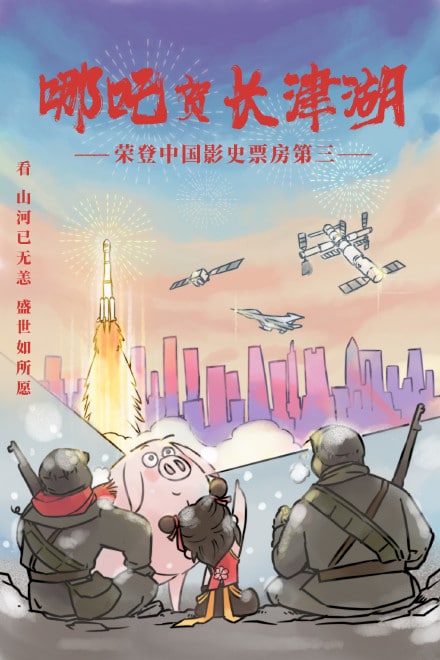
The hit movie Ne Zha congratulates Changjin Lake for its box-office success.
This interaction between two of the biggest Chinese movies of the past years in China garnered a lot of attention on Weibo, where people applauded both films. A hashtag dedicated to Na Zhe congratulating Changjin Lake (#哪吒给长津湖的贺图#) was viewed over 170 million times. “I love you both! Together we will further promote Chinese cinema,” one popular comment on Weibo said.
Engaging with Changjin: Eating Frozen Potatoes to Show Solidarity
Over the past weeks, netizens interacted with Changjin Lake in various ways, starting discussion groups, fan clubs, and sharing experiences of going to see the movie.
Considering that The Battle at Lake Changjin was made with government support and guidance,7 it is perhaps unsurprising to see that Chinese state media have also been actively promoting the movie on social media in various ways. Since long before the premiere of Changjin Lake, state media outlets including People’s Daily and Xinhua have consistently been featuring news relating to the movie through their channels.
The official Study Xi, Strong Country app, a Chinese app where users can score points by learning Xi Jinping Thought, issued a service where points could be exchanged for Changjin Lake movie tickets.
Besides the direct promotion of the movie itself, Chinese media outlets have also come up with other initiatives related to the movie. CCTV posted various videos on social media featuring Chinese veteran volunteer soldiers. One video was dedicated to a 93-year-old Korean War veteran Li Changyan, who is described as “the real Wu Qianli,” launching the Weibo hashtag “Wu Qianli from the Movie Really Exists” (#电影中的伍千里真实存在#).
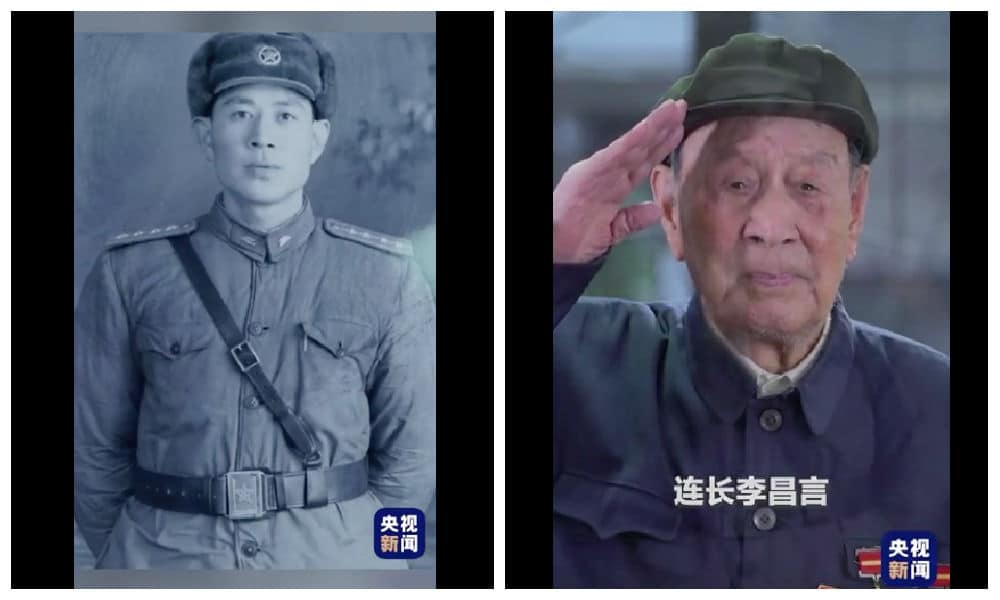
“Wu Qianli from the movie really exists,” a short video portraying the 93-year-old Commander Li Changyan.
These kinds of initiatives further strengthened the online presence and hype of the Changjin Lake movie, inviting more interaction between the movie, the media, and netizens.
Besides the online discussions and art works dedicated to the film, there were also social media users who, inspired by the scenes of the soldiers on the battlefield, prepared frozen potatoes to try for themselves. Some local cinemas even distributed frozen potatoes to audiences before the movie.
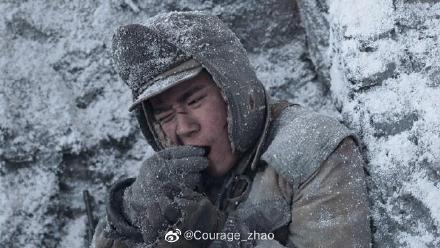

The trend was sparked by one young woman from Yunnan, who decided to film herself while eating frozen potatoes after watching Changjin Lake. Applauded as a gesture of solidarity, the move went viral and saw over 590 million views on Weibo alone (#女孩看完长津湖回家尝冻土豆#). Since then, many people on Weibo and TikTok have posted videos of themselves eating frozen potatoes to honor the Chinese soldiers.
Trends such as these helped build hype around the movie, making the movie even more popular for its popularity.8 Showing personal engagement with the film, countless social media users in China are posting photos of their movie tickets.

See my ticket! Netizens showing others on social media that they went to see the movie.
Others also share selfies at the cinema with official Changjin Lake merchandise, which includes memorabilia such as big drinking cups, toy figures, or a military vehicle that is actually a popcorn box.


Moviegoers sharing photos of the official merchandise they got when watching Changjin Lake.
Whether it’s on social media, at the box office, or in Chinese official media, The Battle at Lake Changjin definitely is the biggest movie of the year and has come to represent much more than just the film alone.
“The mighty martyrs of the People’s Volunteer Army will never be forgotten,” is the last sentence featured in Changjin Lake before the movie ends. Several videos on social media show how some moviegoers in local theaters across China stand up and salute the cinema screen after the film has ended – 21st century Chinese moviegoers have never been more dedicated to watching a film.
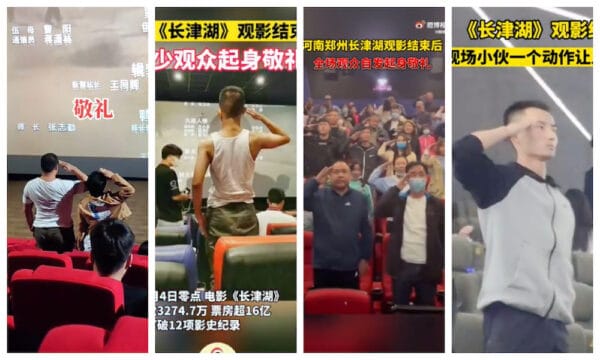
Various videos circulating on social media show Chinese moviegoers saluting after the ending of the Changjin Lake movie.
For some on social media, the hype surrounding the epic war movie has led to a fear of missing out. With so many internet users sharing a photo of their cinema visit on social media throughout October, one Weibo user posted an image with her movie ticket on October 23, writing: “I feel like I’m the last person in China to go and see this movie.”
Watch the trailer for The Battle at Lake Changjin here.
By Manya Koetse
Follow @whatsonweibo
1 For more on this, see: Li, Xiaobing. 2020. Attack at Chosin: The Chinese Second Offensive in Korea. Norman: University of Oklahoma Press, page 29-31.
2 Li, Attack at Chosin, page 16, 32.
3 Chinese: “如果这一仗我们不打,就会是我们的下一代打”
4 “让大家看到:中国人是不好惹的”
5 For more on this see: Berry, Chris. 2018. “Wolf Warrior 2 : Imagining the Chinese Century.” Film Quarterly 72(2): 38-44.
6 Xiao Yang. 2021. “The Era of Baokuan Films: How Chinese Social Media Creates Box Office Successes.” Journal of Chinese Cinemas 15(1), page 108.
7 Wang Jiequn, director of the Beijing Municipal Film Administration and part of the Communist Party’s propaganda office in Beijing, reportedly said at a news conference in September of 2021 that the authorities had “organized and planned” the production together with the film’s makers, Bona Film Group and Bayi Film Studio (See: Myers, Steven Lee & Amy Chang Chien. 2021. “For China’s Holidays, a Big-Budget Blockbuster Relives an American Defeat.” The New York Times, October 8 [10.21.21]
https://www.nytimes.com/2021/10/05/world/asia/battle-lake-changjin.html).
8 Xiao Yang (2021) refers to the “Matthew effect”: popular products get more popular (116).
Featured image by Ama for Yi Magazin.
This text was written for Goethe-Institut China under a CC-BY-NC-ND-4.0-DE license (Creative Commons) as part of a monthly column in collaboration with What’s On Weibo.
Spotted a mistake or want to add something? Please let us know in comments below or email us. First-time commenters, please be patient – we will have to manually approve your comment before it appears.
Manya Koetse is the founder and editor-in-chief of whatsonweibo.com. She is a writer, public speaker, and researcher (Sinologist, MPhil) on social trends, digital developments, and new media in an ever-changing China, with a focus on Chinese society, pop culture, and gender issues. She shares her love for hotpot on hotpotambassador.com. Contact at manya@whatsonweibo.com, or follow on Twitter.

China Arts & Entertainment
“Old Bull Eating Young Grass”: 86-Year-Old Chinese Painter Fan Zeng Marries 36-Year-Old Xu Meng
Online reactions to the news of Fan’s marriage to Xu Meng, his fourth wife, reveal that the renowned artist is not particularly well-liked among Chinese netizens.
Published
17 hours agoon
April 18, 2024
The recent marriage announcement of the renowned Chinese calligrapher/painter Fan Zeng and Xu Meng, a Beijing TV presenter 50 years his junior, has sparked online discussions about the life and work of the esteemed Chinese artist. Some netizens think Fan lacks the integrity expected of a Chinese scholar-artist.
Recently, the marriage of a 86-year-old Chinese painter to his bride, who is half a century younger, has stirred conversations on Chinese social media.
The story revolves around renowned Chinese artist, calligrapher, and scholar Fan Zeng (范曾, 1938) and his new spouse, Xu Meng (徐萌, 1988). On April 10, Fan announced their marriage through an online post accompanied by a picture.
In the picture, Fan is seen working on his announcement in calligraphic form.

Fan Zeng announces his marriage on Chinese social media.
In his writing, Zeng shares that the passing of his late wife, three years ago, left him heartbroken, and a minor stroke also hindered his work. He expresses gratitude for Xu Meng’s care, which he says led to his physical and mental recovery. Zeng concludes by expressing hope for “everlasting harmony” in their marriage.
Fan Zeng is a calligrapher and poet, but he is primarily recognized as a contemporary master of traditional Chinese painting. Growing up in a well-known literary family, his journey in art began at a young age. Fan studied under renowned mentors at the Academy of Fine Arts in Beijing, including Wu Zuoren, Li Keran, Jiang Zhaohe, and Li Kuchan.
Fan gained global acclaim for his simple yet vibrant painting style. He resided in France, showcased his work in numerous exhibitions worldwide, and his pieces were auctioned at Sotheby’s and Christie’s in the 1980s.[1] One of Fan’s works, depicting spirit guardian Zhong Kui (钟馗), was sold for over 6 million yuan (828,000 USD).

Zhong Kui in works by Fan Zeng.
In his later years, Fan Zeng transitioned to academia, serving as a lecturer at Nankai University in Tianjin. At the age of 63, he assumed the role of head of the Nankai University Museum of Antiquities, as well as holding various other positions from doctoral supervisor to honorary dean.
By now, Fan’s work has already become part of China’s twentieth-century art history. Renowned contemporary scholar Qian Zhongshu once remarked that Fan “excelled all in artistic quality, painting people beyond mere physicality.”
A questionable “role model”
Fan’s third wife passed away in 2021. Later, he got to know Xu Meng, a presenter at China Traffic Broadcasting. Allegedly, shortly after they met, he gifted her a Ferrari, sparking the beginning of their relationship.

A photo of Xu and her Hermes Birkin 25 bag has also been making the rounds on social media, fueling rumors that she is only in it for the money (the bag costs more than 180,000 yuan / nearly 25,000 USD).
On Weibo, reactions to the news of Fan’s marriage to Xu Meng, his fourth wife, reveal that the renowned artist is not particularly well-liked among netizens. Despite Fan’s reputation as a prominent philanthropist, many perceive his recent marriage as yet another instance of his lack of integrity and shamelessness.

Fan Zeng and Xu Meng. Image via Weibo.
One popular blogger (@好时代见证记录者) sarcastically wrote:
“Warm congratulations to the 86-year-old renowned contemporary erudite scholar and famous calligrapher Fan Zeng, born in 1938, on his marriage to Ms Xu Meng, a 50 years younger 175cm tall woman who is claimed to be China’s number one golden ratio beauty. Mr Fan Zeng really is a role model for us middle-aged greasy men, as it makes us feel much less uncomfortable when we’re pursuing post-90s youngsters as girlfriends and gives us an extra shield! Because if contemporary Confucian scholars [like yourself] are doing this, then we, as the inheritors of Confucian culture, can surely do the same!“
Various people criticize the fact that Xu Meng is essentially just an aide to Fan, as she can often be seen helping him during his work. One commenter wrote: “Couldn’t he have just hired an assistant? There’s no need to turn them into a bed partner.”
Others think it’s strange for a supposedly scholarly man to be so superficial: “He just wants her for her body. And she just wants him for his inheritance.”
“It’s so inappropriate,” others wrote, labeling Fan as “an old bull grazing on young grass” (lǎoniú chī nèncǎo 老牛吃嫩草).
Fan is not the only well-known Chinese scholar to ‘graze on young grass.’ The famous Chinese theoretical physicist Yang Zhenning (杨振宁, 1922), now 101 years old, also shares a 48-year age gap with his wife Weng Fen (翁帆). Fan, who is a friend of Yang’s, previously praised the love between Yang and Weng, suggesting that she kept him youthful.

Older photo posted on social media, showing Fan attending the wedding ceremony of Yang Zhenning and his 48-year-younger partner Weng Fen.
Some speculate that Fan took inspiration from Yang in marrying a significantly younger woman. Others view him as hypocritical, given his expressions of heartbreak over his previous wife’s passing, and how there’s only one true love in his lifetime, only to remarry a few years later.
Many commenters argue that Fan Zeng’s conduct doesn’t align with that of a “true Confucian scholar,” suggesting that he’s undeserving of the praise he receives.
“Mr. Wang from next door”
In online discussions surrounding Fan Zeng’s recent marriage, more reasons emerge as to why people dislike him.
Many netizens perceive him as more of a money-driven businessman rather than an idealistic artist. They label him as arrogant, critique his work, and question why his pieces sell for so much money. Some even allege that the only reason he created a calligraphy painting of his marriage announcement is to profit from it.
Others cast doubt on his status as a Chinese calligraphy ‘grandmaster,’ noting that his calligraphy style is not particularly impressive and may contain typos or errors. His wedding announcement calligraphy appears to blend traditional and simplified characters.

Netizens have pointed out what looks like errors or typos in Fan’s calligraphy.
Another source of dislike stems from his history of disloyalty and his feud with another prominent Chinese painter, Huang Yongyu (黄永玉). Huang, who passed away in 2023, targeted Fan Zeng in some of his satirical paintings, including one titled “When Others Curse Me, I Also Curse Others” (“人骂我,我亦骂人”). He also painted a parrot, meant to mock Fan Zeng’s unoriginality.

Huang Yongyu made various works targeting Fan Zeng.
In retaliation, Fan produced his own works mocking Huang, sparking an infamous rivalry in the Chinese art world. The two allegedly almost had a physical fight when they ran into each other at the Beijing Hotel.

Fan Zeng mocked Huang Yongyu in some of his works.
Fan and Huang were once on good terms though, with Fan studying under Huang at the Central Academy of Fine Arts in Beijing. Through Huang, Fan was introduced to the renowned Chinese novelist Shen Congwen (沈从文, 1902-1988), Huang’s first cousin and lifelong friend. As Shen guided Fan in his studies and connected him with influential figures in China’s cultural circles, their relationship flourished.
However, during the Cultural Revolution, when Shen was accused of being a ‘reactionary,’ Fan Zeng turned against him, even going as far as creating big-character posters to criticize his former mentor.[2] This betrayal not only severed the bond between Shen and Fan but also ended Fan’s friendship with Huang, and it is still remembered by people today.
Fan Zeng’s behavior towards another former mentor, the renowned painter Li Kuchan (李苦禪, 1899-1983), was also controversial. Once Fan gained fame, he made it clear that he no longer respected Li as his teacher. Li later referred to Fan as “a wolf in sheep’s clothes,” and apparently never forgave him. Although the exact details of their falling out remain unclear, some blame Fan for exploiting Li to further his own career.
There are also some online commenters who call Fan Zeng a “Mr Wang from next door” (隔壁老王), a term jokingly used to refer to the untrustworthy neighbor who sleeps with one’s wife. This is mostly because of the history of how Fan Zeng met his third wife.
Fan’s first wife was the Chinese female calligrapher Lin Xiu (林岫), who came from a wealthy family. During this marriage, Fan did not have to worry about money and focused on his artistic endeavours. The two had a son, but the marriage ended in divorce after a decade. Fan’s second wife was fellow painter Bian Biaohua (边宝华), with whom he had a daughter. It seems that Bian loved Fan much more than he loved her.
It is how he met his third wife that remains controversial to this day. Nan Li (楠莉), formerly named Zhang Guiyun (张桂云), was married to performer Xu Zunde (须遵德). Xu was a close friend of Fan, and helped him out when Fan was still poor and trying to get by while living in Beijing’s old city center.
Wanting to support Fan’s artistic talent, Xu let Fan Zeng stay over, supported him financially, and would invite him for meals. Little did he know that while Xu was away to work, Fan enjoyed much more than meals alone; Fan and Xu’s wife engaged in a secret decade-long affair.
When the affair was finally exposed, Xu Zunde divorced his wife. Still, they would use his house to meet and often locked him out. Three years later, Nan Li officially married Fan Zeng. Xu not only lost his wife and friend but also ended up finding his house emptied, his two sons now bearing Fan’s surname.
When Nan Li passed away in 2021, Fan Zeng published an obituary that garnered criticism. Some felt that the entire text was actually more about praising himself than focusing on the life and character of his late wife, with whom he had been married for forty years.

Fan Zeng and his four wives
An ‘old pervert’, a ‘traitor’, a ‘disgrace’—there are a lot of opinions circulating about Fan that have come up this week.
Despite the negativity, a handful of individuals maintain a positive outlook. A former colleague of Xu Meng writes: “If they genuinely like each other, age shouldn’t matter. Here’s to wishing them a joyful marriage.”
By Manya Koetse
[1]Song, Yuwu. 2014. Biographical Dictionary of the People’s Republic of China. United Kingdom: McFarland & Company, 76.
[2]Xu, Jilin. 2024. “Xu Jilin: Are Shen Congwen’s Tears Related to Fan Zeng?” 许纪霖:沈从文的泪与范曾有关系吗? The Paper, April 15. https://www.thepaper.cn/newsDetail_forward_27011031. Accessed April 17, 2024.
Independently reporting China trends for over a decade. Like what we do? Support us and get the story behind the hashtag by subscribing:
Spotted a mistake or want to add something? Please let us know in comments below or email us. First-time commenters, please be patient – we will have to manually approve your comment before it appears.
©2024 Whatsonweibo. All rights reserved. Do not reproduce our content without permission – you can contact us at info@whatsonweibo.com.
China Memes & Viral
Chengdu Disney: The Quirkiest Hotspot in China
How a senior activity park in Chengdu was ‘Disneyfied’ and became a viral hotspot.
Published
7 days agoon
April 12, 2024
How did a common park turn into a buzzing hotspot? By mixing online trends with real-life fun, blending foreign styles with local charm, and adding a dash of humor and absurdity, Chengdu now boasts its very own ‘Chengdu Disney’. We explain the trend.
– By Manya Koetse, co-authored by Ruixin Zhang
Have you heard about Chengdu Disney yet? If not, it’s probably unlike anything you’d imagine. It’s not actually a Disney theme park opening up in Chengdu, but it’s one of the city’s most viral hotspots these days.
What is now known as ‘Chengdu Disney’ all over the Chinese internet is actually a small outdoor park in a residential area in Chengdu’s Yulin area, which also serves as the local senior fitness activity center.
Crowds of young people are coming to this area to take photos and videos, hang out, sing songs, cosplay, and be part of China’s internet culture in an offline setting.
Once Upon a Rap Talent Show
The roots of ‘Chengdu Disney’ can be traced back to the Chinese hip-hop talent show The Rap of China (中国新说唱), where a performer named Nuomi (诺米), also known as Lodmemo, was eliminated by Chinese rapper Boss Shady (谢帝 Xièdì), one of the judges on the show.
Nuomi felt upset about the elimination and a comment made by his idol mentor, who mistakenly referred to a song Nuomi made for his ‘grandma’ instead of his grandfather. His frustration led to a viral livestream where he expressed his anger towards his participation in The Rap of China and Boss Shady.
However, it wasn’t only his anger that caught attention; it was his exaggerated way of speaking and mannerisms. Nuomi, with his Sichuan accent, repeatedly inserted English phrases like “y’know what I’m saying” and gestured as if throwing punches.
His oversized silver chain, sagging pants, and urban streetwear only reinforce the idea that Nuomi is trying a bit too hard to emulate the fashion style of American rappers from the early 2000s, complete with swagger and street credibility.

Lodmemo emulates the style of American rappers in the early 2000s, and he has made it his brand.
Although people mocked him for his wannabe ‘gangsta’ style, Nuomi embraced the teasing and turned it into an opportunity for fame.
He decided to create a diss track titled Xiè Tiān Xièdì 谢天谢帝, “Thank Heaven, Thank Emperor,” a word joke on Boss Shady’s name, which sounds like “Shady” but literally means ‘Thank the Emperor’ in Chinese. A diss track is a hip hop or rap song intended to mock someone else, usually a fellow musician.
In the song, when Nuomi disses Boss Shady (谢帝 Xièdì), he raps in Sichuan accent: “Xièdì Xièdì wǒ yào diss nǐ [谢帝谢帝我要diss你].” The last two words, namely “diss nǐ” actually means “to diss you” but sounds exactly like the Chinese word for ‘Disney’: Díshìní (迪士尼). This was soon picked up by netizens, who found humor in the similarity; it sounded as if the ‘tough’ rapper Nuomi was singing about wanting to go to Disney.

Nuomi and his diss track, from the music video.
Nuomi filmed the music video for this diss track at a senior activity park in Chengdu’s Yulin subdistrict. The music video went viral in late March, and led to the park being nicknamed the ‘Chengdu Disney.’
The particular exercise machine on which Nuomi performed his rap quickly became an iconic landmark on Douyin, as everyone eagerly sought to visit, sit on the same see-saw-style exercise machine, and repeat the phrase, mimicking the viral video.

What began as a homonym led to people ‘Disneyfying’ the park itself, with crowds of visitors flocking to the park, some dressed in Disney-related costumes.

This further developed the concept of a Chengdu ‘Disney’ destination, turning the park playground into the happiest place in Yulin.
Chengdu: China’s Most Relaxed Hip Hop Hotspot
Chengdu holds a special place in China’s underground hip-hop scene, thanks to its vibrant music culture and the presence of many renowned Chinese hip-hop artists who incorporate the Sichuan dialect into their songs and raps.
This is one reason why this ‘Disney’ meme happened in Chengdu and not in any other Chinese city. But beyond its musical significance, the playful spirit of the meme also aligns with Chengdu’s reputation for being an incredibly laid-back city.
In recent years, the pursuit of a certain “relaxed feeling” (sōngchígǎn 松弛感) has gained popularity across the Chinese internet. Sōngchígǎn is a combination of the word for “relaxed,” “loose” or “lax” (松弛) and the word for “feeling” (感). Initially used to describe a particular female aesthetic, the term evolved to represent a lifestyle where individuals strive to maintain a relaxed demeanor, especially in the face of stressful situations.
🌟 Attention!
For 11 years, What’s on Weibo has remained a 100% independent blog, fueled by my passion to write about China’s digital culture and online trends. Over a year ago, we introduced a soft paywall to ensure the sustainability of this platform. I’m grateful to all our loyal readers who’ve subscribed since 2022. Your support has been invaluable. But we need more subscribers to continue our work. If you appreciate our content and want to support independent China reporting, please consider becoming a subscriber. Your support keeps What’s on Weibo going strong!
The concept gained traction online in mid-2022 when a Weibo user shared a story of a family remaining composed when their travel plans were unexpectedly disrupted due to passport issues. Their calm and collected response inspired the adoption of the “relaxed feeling” term (also read here).
Central to embodying this sense of relaxation is being unfazed by others’ opinions and avoiding unnecessary stress or haste out of fear of judgment.
Nowadays, Chinese cities aim to foster this sense of sōngchígǎn. Not too long ago, there were many hot topics suggesting that Chengdu is the most sōngchí 松弛, the most relaxed city in China.
This sentiment is reflected in the ‘Chengdu Disney’ trend, which both pokes fun at a certain hip-hop aesthetic deemed overly relaxed—like the guys who showed up with sagging pants—and embraces a carefree, childlike silliness that resonates with the city’s character and its people.

Mocking sagging pants at ‘Chengdu Disney.’
Despite the influx of visitors to the Chengdu Disney area, authorities have not yet significantly intervened. Community notices urging respect for nearby residents and the presence of police officers to maintain order indicate a relatively hands-off approach. For now, it seems most people are simply enjoying the relaxed atmosphere.
Being Part of the Meme
An important aspect that contributes to the appeal of Chengdu Disney is its nature as an online meme, allowing people to actively participate in it.

Scenes from Chengdu Disney, images via Weibo.
China has a very strong meme culture. Although there are all kinds of memes, from visual to verbal, many Chinese memes incorporate wordplay. In part, this has to do with the nature of Chinese language, as it offers various opportunities for puns, homophones, and linguistic creativity thanks to its tones and characters.
The use of homophones on Chinese social media is as old as Chinese social media itself. One of the most famous examples is the phrase ‘cǎo ní mǎ’ (草泥马), which literally means ‘grass mud horse’, but is pronounced in the same way as the vulgar “f*ck your mother” (which is written with three different characters).
In the case of the Chengdu Disney trend, it combines a verbal meme—stemming from the ‘diss nǐ’ / Díshìní homophone—and a visual meme, where people gather to pose for videos/photos in the same location, repeating the same phrase.
Moreover, the trend bridges the gap between the online and offline worlds, as people come together at the Chengdu playground, forming a tangible community through digital culture.
The fact that this is happening at a residential exercise park for the elderly adds to the humor: it’s a Chengdu take on what “urban” truly means. These colorful exercise machines are a common sight in Chinese parks nationwide and are actually very mundane. Transforming something so normal into something extraordinary is part of the meme.

A 3D-printed model version of the exercise equipment featured in Nuomi’s music video.
Lastly, the incorporation of the Disney element adds a touch of whimsy to the trend. By introducing characters like Snow White and Mickey Mouse, the trend blends American influences (hip-hop, Disney) with local Chengdu culture, creating a captivating and absurd backdrop for a viral phenomenon.
For some people, the pace in which these trends develop is just too quick. On Weibo, one popular tourism blogger (@吴必虎) wrote: “The viral hotspots are truly unpredictable these days. We’re still seeing buzz around the spicy hot pot in Gansu’s Tianshui, meanwhile, a small seesaw originally meant for the elderly in a residential community suddenly turns into “Chengdu Disneyland,” catching the cultural and tourism authorities of Sichuan and even Shanghai Disneyland off guard. Netizens are truly powerful, even making it difficult for me, as a professional cultural tourism researcher, to keep up with them.”
By Manya Koetse, co-authored by Ruixin Zhang
Independently reporting China trends for over a decade. Like what we do? Support us and get the story behind the hashtag by subscribing:
Spotted a mistake or want to add something? Please let us know in comments below or email us. First-time commenters, please be patient – we will have to manually approve your comment before it appears.
©2024 Whatsonweibo. All rights reserved. Do not reproduce our content without permission – you can contact us at info@whatsonweibo.com.
Subscribe

“Old Bull Eating Young Grass”: 86-Year-Old Chinese Painter Fan Zeng Marries 36-Year-Old Xu Meng

Chengdu Disney: The Quirkiest Hotspot in China

Where to Eat and Drink in Beijing: Yellen’s Picks

Weibo Watch: Burning BMWs

More than Malatang: Tianshui’s Recipe for Success

The ‘Two Sessions’ Suggestions: Six Proposals Raising Online Discussions

A Snowball Effect: How Cold Harbin Became the Hottest Place in China

Jia Ling Returns to the Limelight with New “YOLO” Movie and 110-Pound Weight Loss Announcement

Top 9 Chinese Movies to Watch This Spring Festival Holiday

Party Slogan, Weibo Hashtag: “The Next China Will Still Be China”

From Pitch to Politics: About the Messy Messi Affair in Hong Kong (Updated)

Weibo Watch: Frogs in Wells

Looking Back on the 2024 CMG Spring Festival Gala: Highs, Lows, and Noteworthy Moments

Two Years After MU5735 Crash: New Report Finds “Nothing Abnormal” Surrounding Deadly Nose Dive

More than Malatang: Tianshui’s Recipe for Success
Get in touch
Would you like to become a contributor, or do you have any tips or suggestions? Get in touch here!
Popular Reads
-

 China Insight1 month ago
China Insight1 month agoThe ‘Two Sessions’ Suggestions: Six Proposals Raising Online Discussions
-

 China Insight3 months ago
China Insight3 months agoA Snowball Effect: How Cold Harbin Became the Hottest Place in China
-

 China Arts & Entertainment3 months ago
China Arts & Entertainment3 months agoJia Ling Returns to the Limelight with New “YOLO” Movie and 110-Pound Weight Loss Announcement
-

 China Arts & Entertainment2 months ago
China Arts & Entertainment2 months agoTop 9 Chinese Movies to Watch This Spring Festival Holiday




